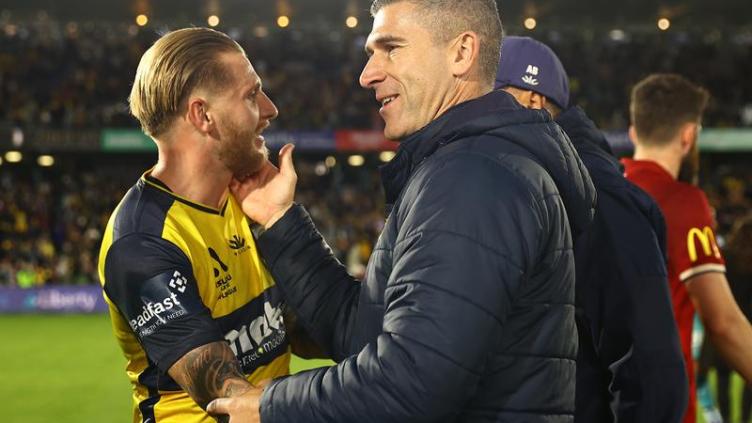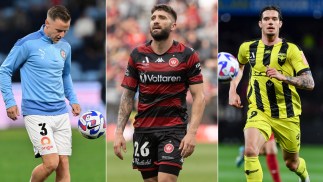Shaun Mielekamp has been through lowest of lows, which is why he’s enjoying this Grand Final so much, writes Tom Smithies
There’s quite an irony in the fact that the man who brought Usain Bolt to the A-Leagues has just marked eight years as the Central Coast Mariners CEO – very much a long-distance run at any club, let alone the one where long-term planning for years began and ended at survival.
Shaun Mielekamp has learnt some hard lessons since his appointment in 2015, which makes the build-up to the club’s first Grand Final on his watch all the more acutely enjoyable. Success has been a long time coming since he left a marketing role at Western Sydney Wanderers to run the club on his doorstep. There have been points along the way where the wisdom of that move has been not so much questionable as certifiable.
Mielekamp could be forgiven at times this season for wondering if the club’s resurgence has been just a dream after more false dawns than an insomniac rooster. After eight years, six coaches and 230 games since his arrival, his club is in the Grand Final and on the verge of a second championship.
It’s some remove from the situation he walked into in 2015, as a Central Coast local aware that “the club needed some help… there was this very clear understanding that ‘This club is not geared right now to survive’.
BUY TICKETS TO THE GRAND FINAL
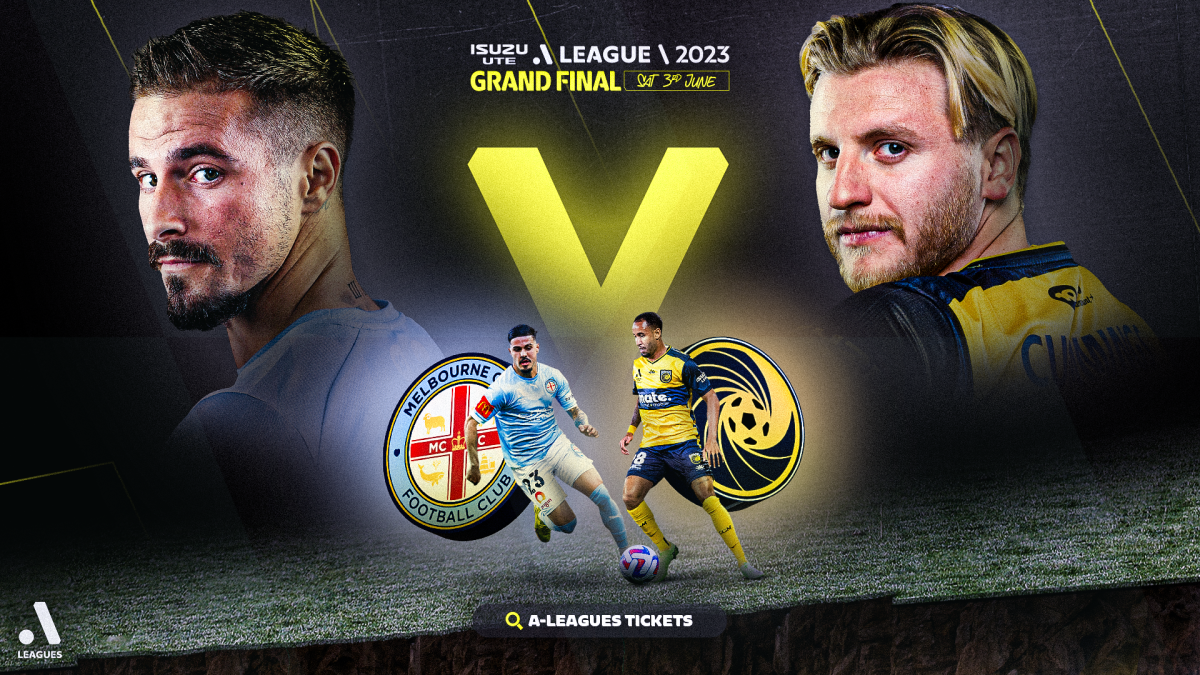
“I live on the Coast and all my friends and family, everybody that I played soccer with, are all Mariners fans and everybody was really concerned. It was pretty clear that the club was in a bad, bad place.”
With owner Mike Charlesworth unwilling to fund the club beyond the minimum operating budget, and seeking investment, Mielekamp had to explore Charlesworth’s plans for revenue driving, including the vexed topic of playing games in places like Canberra and North Sydney.
“You’ve got to understand those scenarios before you can make a proper decision one way or another,” the CEO tells KEEPUP now. “That was part of the journey we went on.
“I feel like as much as I’ve grown as a CEO, (at the start) you’re very excited, very passionate, and it’s not until you’ve got a few black eyes and bloody noses that you really and truly understand what the CEO’s role is.”
And meanwhile, there was football to be played.
The coaches
Mielekamp’s role was a little anomalous for the first few months, with former West Ham managing director Peter Storrie in place as executive vice chairman but largely based in the UK. Storrie had just appointed Tony Walmsley as head coach after an alleged worldwide search, but the club had a uniquely bad season and Walmsley was gone by August 2016.
Apparently out of nowhere, Socceroos legend Paul Okon was plucked from coaching the Young Socceroos and initially signs were promising. But after less than two years Okon left and was replaced by Mike Mulvey who had won the title with Brisbane. In turn that appointment lasted 11 months.
“It’s actually very difficult to talk about any of them (head coaches) in a negative light because I was close with them,” Mielekamp says.
“It’s like a pendulum swinging from one extreme to the other, but it slowly starts to get a little bit closer each time to the center point.
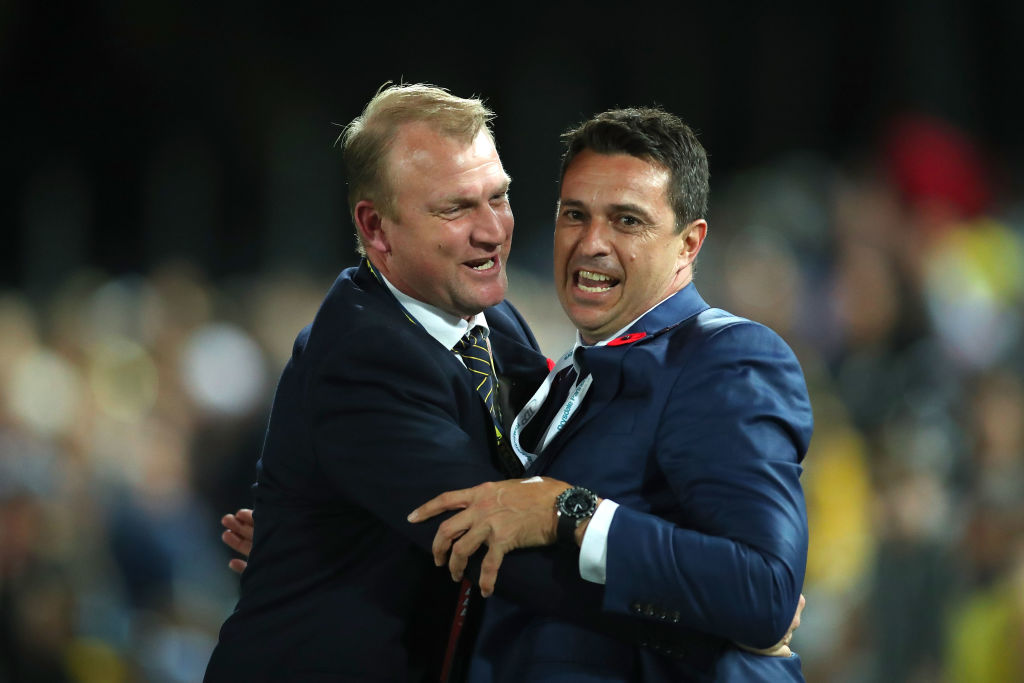
“So from where we were with Tony who was a great public presenter and had a great relationship with Mike (Charlesworth) to Paolo (Okon) who was far more technical but far less bought into the community region – and then we sort of swing back again to Mike Mulvey. Again, these are all really good friends.
“Mike was another great presenter and I don’t think there could have been another coach who could have managed the Usain Bolt trial the way that he did. That all became such a massive distraction that by the time it was finished, it was a big challenge to bring some (football) stuff back.
“Paolo’s name had come up via myself, I suppose and it was almost swinging the pendulum completely the opposite direction. I’d say at that point in time we – myself included – didn’t really understand the club enough and the community enough to make the right decision.
“I’m happy to own that part where between Mike, Peter Storrie and myself we wanted football credibility, wanted a technical coach. We found that, I remember hearing Peter Storrie say he’s a brilliant coach.
READ MORE ON KEEPUP
ISUZU UTE A-LEAGUE GRAND FINAL: Everything you need to know
GRAND FINAL PARTY: Are you ready Sydney?
MAX BALARD: A ‘crazy’ journey through four countries to Gosford
MELB CITY: Two incredible stories sum up their rise
JAMIESON’S RETIREMENT: The moments with his son that will stay with Scott Jamieson for a lifetime
“I’ve got a lot of time and respect for Paolo. It was just the wrong fit for our club. We’ve become really good friends, I’ve got a lot of respect for everything that he did.”
The overriding issue though was none of these coaches could arrest the decline in form, and the Mariners hung around the bottom of the league for so long that technically their licence could have been revoked.
The low points
Mielekamp had produced a five-year plan in 2016, but as a bandage it failed to heal the wound below given the club’s lack of resources. It’s hard to say there was one lowest point when the team – just after Okon had quit – lost 8-2 at home to Newcastle… and then, incredibly, less than 11 months later, again lost 8-2 at home, this time to Wellington, spelling the end of Mulvey’s tenure.
“If there were moments that I really looked back on that, that second one hurt the most,” Mielekamp says. “The two 8-2s are just like scars I’m trying to forget, but I remember there was not a place in the stadium, I couldn’t hide.
“I had members coming in, charging into the (corporate) box and banging on the glass, like one member actually walked straight into the box and just started berating me – and we were only 2-0 down at the time.
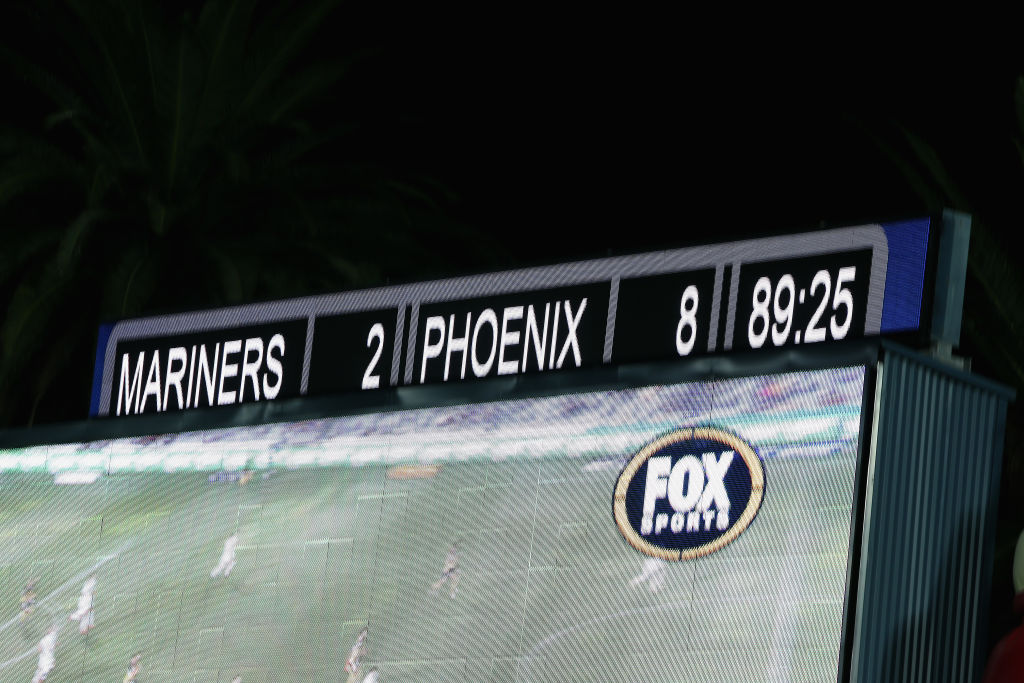
“When I spoke to Mike (Charlesworth) at the end of the game, he was very clear there was no waiting on (reacting to) this.
“So then I had to drive down to Terrigal and knock on Mike (Mulvey)’s door at 1am and have a very tough conversation with someone who I call a good friend. That was a pretty low point.”
Given his earlier comments about the Usain Bolt affair being a distraction, it’s tempting to assume – from the outside – that Mielekamp’s offer to the Olympic champion to trial for a football career was ultimately not a success either.
“Was it a low point? I’d say no and the question is: would we do it again? The opportunity was so mouthwatering and got our brand so much worldwide recognition that it’s hard to say you wouldn’t.
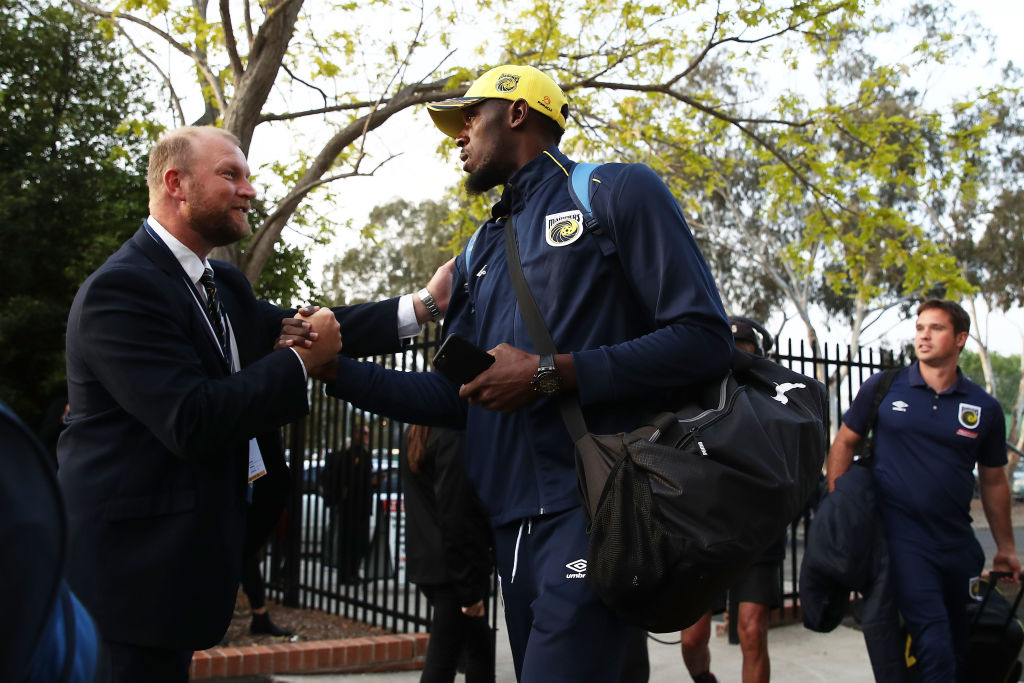
“Ultimately Usain needed the club to be all about him and we just couldn’t focus like that. I remember sitting in Tommy’s Cafe and breaking it to him that we wouldn’t be giving him the $3.5m contract he wanted, but the key point is that at that point our rebuild had actually begun.
“Monty had begun his coaching journey with the club and the foundations of the Academy had been laid; also Matt Simon had come back to the club and was a key part of re-establishing the Mariners culture. With Bolt, it wasn’t a low point so much as… a unique point.”
The rebuild
Mulvey’s exit signalled an appointment by Mielekamp that no one saw coming. Weeks earlier Alen Stajcic had been sacked as Matildas coach amid a sea of unwarranted headlines that led later to him getting a public apology. Suddenly he was being unveiled at the Mariners.
“I knew Staj, I knew that he needed us as much as we (needed him) – most importantly I trusted Staj and I just needed someone I could trust (after the 8-2 loss),” says Mielekamp.
“We were in a living hell at that point in time, you know, and we were still midseason. We still had a season to get through, literally it was who could be here within a week, and try to get some credibility back at this club.
“It was a big favour that we asked, for Staj to take that leap of faith with everything that he was going through. It’s still a testament to Staj that he was brave enough to put himself out there at that point of time in his life to get into a club that was absolutely on its knees.
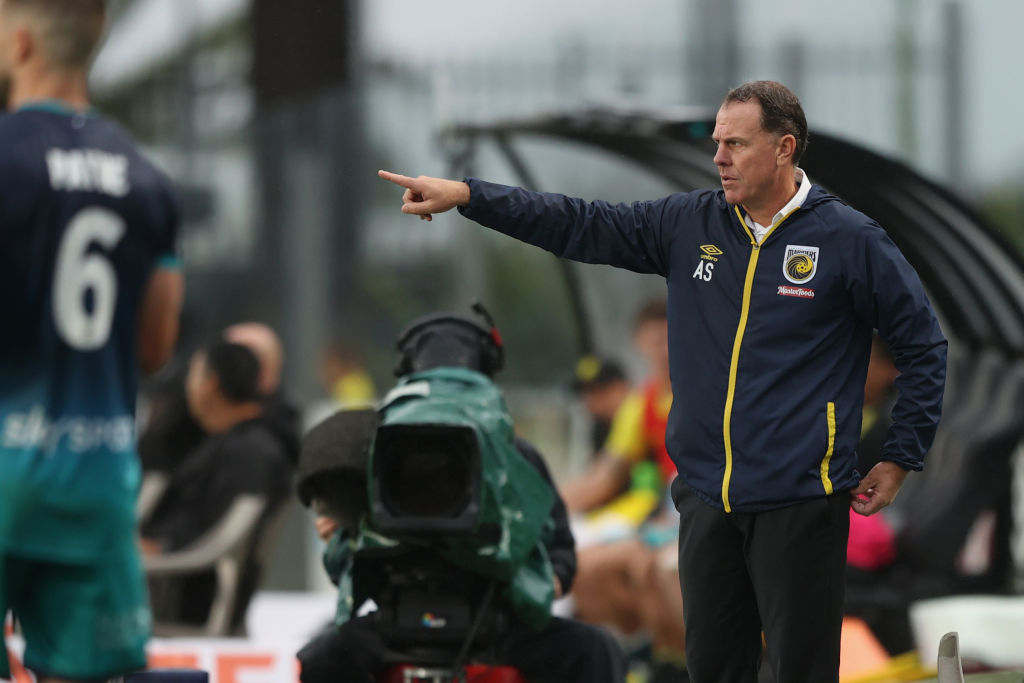
“I remember that very first game that he coached up in Newcastle and he got the win. Staj and the club found each other at the right time for the right reasons. It was probably never one that was a really long-term partnership. Staj is a great mate, he’s coming to the Grand Final as our guest. None of today would have happened without Staj.”
In his second full season, Stajcic took the Mariners to their first finals since 2014, and then walked away; weeks later Montgomery was appointed. “For where Staj’s family was at, to be away from his family and knowing how much this community needed him to be ingrained into it… he really, understood the club a lot,” adds Mielekamp.
“He understood the budgets and the constraints and the personal tolls that this was really going to take for him. It was with great fondness that we knew it was just the right time to close the chapter, as much as it was a shock for everybody.
“Monty was the one who’s always believed in this club but still we challenged ourselves to have other options (to replace Stajcic). We’d learned those lessons from previous coaches, that we needed to have a process and actually compare candidates.
“As much as it may have been a little frustrating for Monty, hopefully it helps him know that he got it on his own merits as a quality coach.
“It was always clear then that Monty and (assistant) Sergio (Raimundo) had brought the winning mentality back to the club in the Academy.”
The future
Now, for the first time, Mielekamp faces a very different set of challenges: how to build on success, rather than root out failure. A year ago, gym chain owner Richard Peil became chairman and started investing in the club; even helping to physically build new facilities at the club’s training ground. But still Mielekamp knows each step now is vital.
“I actually spoke to Mike Charlesworth just the other night about this,” he says. “We spoke about when I started and the reflection that the club was not ready for success when it had success last time.
“The club didn’t have an academy, didn’t have the right structures in the background, the sponsorship family wasn’t established. We had already started the disconnection with the community as we went into that (losing) run.
“So Mike challenged me: ‘well mate, you’ve been here for eight years, is the club ready now?’ When Richard Peil came in, it was a big change for myself because as a CEO it’s very easy to always say no.
“So I’d have to hit the reset button on my own style and mentality that, you know, it’s not always on the smell of an oily rag.
“But what comes with that is accountability. When you’ve got no money you’ve got every excuse under the sun. Now there are no excuses because we do have the options, so there’s far more pressure now to get this right.
“The club is in growth phase, we’ve got a women’s team coming in October, we’ve got to fund that and make sure it’s accelerated to a level that matches the men’s.
“In September we’ve qualified for the AFC Cup, our team will be traveling through Asia just as the NPL season comes to the end, and we’re also in preseason and also playing Australia Cup.
“So we literally have four worlds collide at a time when we’ve really got to be maximizing it and we’ll have every distraction under the sun, but they can’t be excuses.
”You know, I’ve been here for the last eight years and the focus has always been, can we get the crowds back, can we get back to the glory days? Can it be back to what it was?
“None of that’s relevant. It’s all about what’s in the future. Everything relevant is to the future and the difference moving forward for us is now we can sustain a slump.
“If we have some tough years, everybody knows that success is around the corner and it’s coming. We’re in a far better position to be established long-term and it’s all about looking forward now.
“This will be one of the last times I look to talk about what we’ve done. Just want to close the chapter on it, set new goals.
“And then, come June 4, it’s all about moving forward regardless of the result on the big stage.”


